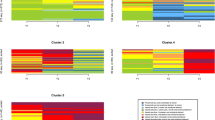Abstract
During prebaseline observations, three students diagnosed with autism were unable to make social initiations to another individual. The ability to make initiations would be considered a “pivotal response” in that it would allow an individual to come into contact with a wide variety of social reinforcement. A multiplebaseline design was implemented to measure the effects of a using a self-management package to teach the students to make social initiations. Two interventionists worked with each student to prompt and reinforce initiations. All students acquired social initiations during externally-determined reinforcement. The initiations were maintained when reinforcement changed from externally determined to a self-management system. The prompts to initiate and self-reinforce were faded over the course of the sessions. The use of self-management by the student led to less need for staff intervention. Implications from the literature are discussed.
Similar content being viewed by others
References
Brigham, T. A. (1980). Self-control revisited: Or why doesn’t anyone read Skinner anymore? The Behavior Analyst, 3, 25–33.
Catania, A. C. (1975). The myth of self-reinforcement. Behaviorism, 3, 192–199.
Goldiamond, I. (1976). Self-reinforcement. Journal of Applied Behavior Analysis, 9, 509–514.
Koegel, R. L., & Koegel, L. K. (1995). Teaching children with autism. Toronto: Paul H. Brookes.
Koegel, L.K., Koegel, R.L., & Dunlap, G. (1996). Positive behavioral support: Including people with difficult behavior in the community. Toronto: Paul H. Brookes.
Koegel, L. K., Koegel, R. L., Hurley, C, & Frea, W. D. (1992). Improving social skills and disruptive behavior in children with autism through self-management. Journal of Applied Behavior Analysis, 25, 341–353.
Lovaas, O.I. (2003). Teaching individual s with developmental delays. Austin, TX: Pro-Ed.
Maurice, C, Green, G, Foxx, R. M. (2001). Making a difference: Behavioral intervention for autism. Austin, TX: Pro-Ed.
Newman, B., Buffington, D. M, & Hemmes, N. S. (1996). External and self-reinforcement used to increase the appropriate conversation of autistic teenagers. Education and Training in Mental Retardation and Developmental Disabilities, 31, 304–309.
Newman, B., Buffington, D. M, Hemmes, N. S., & Rosen, D. (1996). Answering objections to self-management and related concepts. Behavior and Social Issues, 6 (2), 85–95.
Newman, B., Buffington, D. M, O’Grady, M. A., McDonald, M.E., Poulson, C. L., & Hemmes, N.S. (1995). Self-management of schedule-following in three teenagers with autism. Behavioral Disorders, 20 (3), 195–201.
Newman, B., Reinecke, D. R., & Meinberg, D. (2000). Self-management of varied responding in children with autism. Behavioral Interventions, 15, 145–151.
Newman, B., Tuntigian, L, Ryan, C. S., & Reinecke, D. R. (1997). Self-management of a DRO procedure by three students with autism. Behavioral Interventions, 12, 149–156.
Ninness, H. A., Fuerst, J., Rutherford, R. D., & Glenn, S. S. (1991). Effects of self-management training and reinforcement on the transfer of improved conduct in the absence of supervision. Journal of Applied Behavior Analysis, 24, 499–508.
Reinecke, D. R., Newman, B., & Meinberg, D. (1999). Self-management of sharing in preschoolers with autism. Education and Training in Mental Retardation, 34, 312–317.
Stahmer, A. C, & Schriebman, L. (1992). Teaching children with autism appropriate play in unsupervised environments using a self-management treatment package. Journal of Applied Behavior Analysis, 25, 447–459.
Sundberg, M. L., & Partington, J. W. (1998). Teaching language to children with autism or other developmental disabilities. Pleasant Hill, CA: Behavior Analysts, Inc.
Author information
Authors and Affiliations
Corresponding author
Additional information
We would like to acknowledge the parents of the children involved in the study for their support, as well as the students themselves. We also thank three anonymous reviewers and the journal editor for many helpful suggestions. Research was supported by the Moody’s Foundation.
Rights and permissions
About this article
Cite this article
Newman, B., Eyck, P.T. Self-management of Initiations by Students Diagnosed with Autism. Analysis Verbal Behav 21, 117–122 (2005). https://doi.org/10.1007/BF03393013
Published:
Issue Date:
DOI: https://doi.org/10.1007/BF03393013




